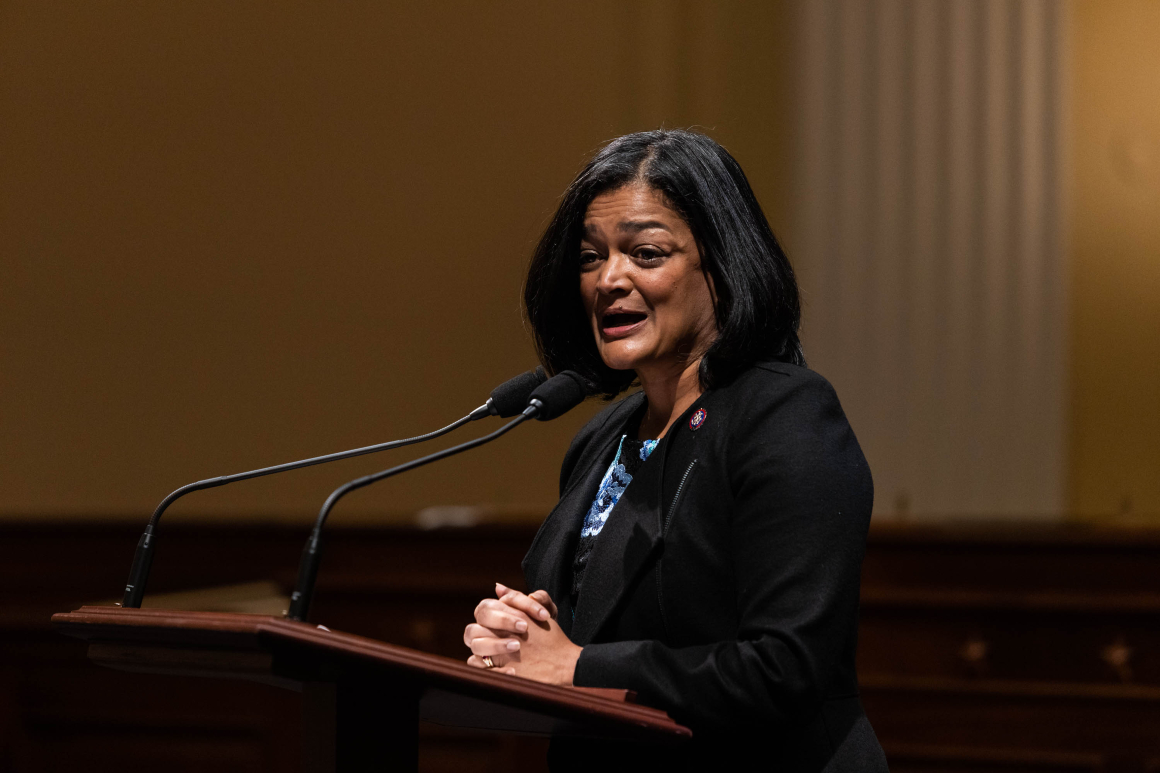Democrats are back in a familiar spot this week, pushing hard for legislation they know will fail. And they’re grappling openly with what to tell their voters when they come up short.
In many ways, Democrats’ bind on their election reform legislation is a sequel to the stalemate they’re trapped in on their $1.7 trillion party-line social spending plan. Both bills, which have no GOP support, pitted the party’s base and most of its members against Senate centrist resistance. But Democratic leaders set the stakes even higher for their bid to shore up the Voting Rights Act, portraying the lack of action as a threat to democracy itself.
All of those efforts were focused on budging two centrists, Sens. Joe Manchin (D-W.Va.) and Kyrsten Sinema (D-Ariz.), neither of whom will revisit their defense of upper-chamber rules designed to empower the minority party. And now that they’re days away from predictable doom in their push to enact the legislation by changing Senate rules, rank-and-file Democrats are beginning to acknowledge the looming defeat that their leaders won’t concede in public.
“I just tell people we did the best that we could,” said Sen. Tammy Duckworth (D-Ill.). “I just say specifically that whoever votes no on the rules change, it’s their responsibility that we couldn’t get this done.”
Those no votes on changing Senate rules, however, include Manchin and Sinema. And that’s the problem for Democrats as they slog through a brutal two months for President Joe Biden’s legislative agenda: Their base is fitting its own centrists for the black hat as often as it does the GOP.
Rank-and-file House members are shifting from criticizing Manchin and Sinema less to training their ire on Republicans. But they’re also starting to ding their own leaders for overpromising and underdelivering.
The Senate’s election reform vote this week is an unusual move for Senate Majority Leader Chuck Schumer. The New Yorker typically does not put votes on the floor that are destined to fail and preaches party unity. Even as the coming vote will only underscore Democrats’ internal divisions over changing Senate rules, many in Schumer’s caucus view the vote as necessary to show that the party did all it could to get the legislation done in response to a slew of GOP-backed state laws that add new voting restrictions.
"This is probably one of those votes that we absolutely have to have," said Sen. Martin Heinrich (D-N.M.). "Whether it’s good strategy or not, it’s more important for those people whose votes are being jeopardized. It’s absolutely critical that they understand who is on their side."
Of course, the rules-change vote will highlight that Manchin and Sinema aren’t interested in chipping away at the filibuster. Even so, their fellow Democrats are preparing to soon shift the blame to the GOP.
“Republicans haven’t been forced into a conversation about why they would be opposing voting rights at this critical juncture,” Rep. Pramila Jayapal (D-Wash.), chair of the Congressional Progressive Caucus, told reporters last week. “If we have to go back to people and try to explain why we don’t have voting rights, it is really important that they hear from Republicans themselves why they are blocking this critical legislation.”
Rep. Marc Veasey (D-Texas) said in an interview that “it’s sad that you need every Democrat to be able to pass this and that you don’t have enough Republicans in this country that care about democracy and care about voting rights.”
Indeed, frustrations among Black lawmakers are increasingly evident within the party. After leading the battle to protect voting rights for decades and watching minority voters play a central role in Biden’s victory, Black Democrats are both fatalistic and determined about their chances of rolling back the new state-level voting laws.
“First time I voted, I had to buy a poll tax,” said Rep. Eddie Bernice Johnson (D-Texas), who’s retiring at the end of this Congress. “It’s been a struggle all my life and I just imagine it will continue to be the rest of my life, but I will not give up.”
That the Senate’s fight over rules changes would come down to an unconvinced Manchin and Sinema might feel predictable. But it was a star-crossed appointment the party almost had to keep; progressive activists have yearned for a whack at the filibuster ever since Democrats won the 2020 election, and several have criticized lawmakers for waiting too long to take one.
Schumer, however, wagered that his caucus first needed to coalesce around a legislative vehicle that pitted it against Republicans. Once that occurred, some Democrats privately hoped that Manchin would shift his opposition to unilateral rules changes; after all, the West Virginian had reached out to Republicans and gotten no support for his compromise elections bill.
But Manchin and Sinema only dug in further, prompting some other Democrats to question whether the party needs to be more realistic with its outside groups about how much it can accomplish with such slim congressional majorities.
All of which leaves Democrats in pre-election peril of sorts, having approved $1.9 trillion in Covid aid and a $500 billion bipartisan infrastructure deal but staking their pitch to their voters on voting reform and social spending — both of which are stalled. With that in mind, the party is steadying its pitch for electing larger Democratic majorities this fall, aware of its challenge given Biden’s drop in approval and the historical backlash in midterms against the party in power.
“There’s no way around the devastation of promising a commitment to try to do something around voting rights and not being able to make that commitment,” Rep. Terri Sewell (D-Ala.) said in an interview. “But at the same time … the continuous message that I have always given is that every election is important and that elections do have consequences and every vote does matter.”
In order to rethink their messaging to voters, some Democrats are urging their leaders to kick the habit of over-promising and under-delivering that the election reform and social spending bills have showcased.
Rep. Dean Phillips (D-Minn.) said he’s “afraid recent missteps have indicated” that cycle hasn’t changed yet. And Rep. Elissa Slotkin (D-Mich.) sees a similar problem in a party that talks more about its losses than its wins.
“I don’t have a problem with the focus we’re putting on the basic tenets of democracy, but we’re a big government,” Slotkin said. “Do I think we’re always great at communicating? No. We have a major communication issue, and I’ve been more and more vocal because I think it’s now holding us back.”




















